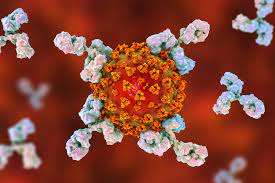
Antibodies are incredible molecules that play a vital role in our immune system, protecting us from harmful pathogens and foreign substances. These Y-shaped proteins are produced by our body’s white blood cells, and they possess the remarkable ability to recognize and neutralize specific antigens.
In this article, we will dive into the fascinating world of antibodies and explore 19 incredible facts that highlight their importance and versatility. From their role in immunity to their diverse functions, we will uncover intriguing details about these tiny warriors that safeguard our health.
So, get ready to be amazed as we unravel the mysteries of antibodies and discover the remarkable ways they contribute to our body’s defense mechanisms.
Key Takeaways:
- Antibodies are like superheroes in our bodies, fighting off harmful germs and keeping us healthy. They have special powers to recognize and neutralize different types of invaders, making them essential for our immune system’s defense.
- Scientists use antibodies to develop new medicines and diagnostic tests, helping to treat diseases and keep us safe. Antibodies are like tiny detectives that can identify specific targets, making them valuable tools for medical and scientific discoveries.
Antibodies are part of the immune system.
Antibodies, also known as immunoglobulins, play a crucial role in defending our bodies against harmful pathogens.
There are five different types of antibodies.
The five major types of antibodies are IgG, IgM, IgA, IgD, and IgE, each with unique functions and characteristics.
Antibodies are produced by B cells.
B cells, a type of white blood cell, are responsible for generating antibodies in response to the presence of antigens.
Antibodies can recognize and bind to specific antigens.
Antigens are foreign substances that trigger an immune response. Antibodies have specific binding sites that can recognize and attach to specific antigens.
Antibodies can neutralize pathogens.
When antibodies bind to antigens on pathogens, they can prevent the pathogens from entering or infecting cells, effectively neutralizing their harmful effects.
Antibodies can activate the complement system.
The complement system is a group of proteins that work together to eliminate pathogens. Antibodies can activate this system, amplifying the immune response.
Antibodies can be used in medical treatments.
Monoclonal antibodies, which are artificially produced antibodies, have been developed for various therapeutic purposes, including the treatment of cancer and autoimmune diseases.
Antibodies have a Y-shaped structure.
The basic structure of an antibody resembles the letter Y, with the two arms of the Y containing the antigen-binding sites.
Antibodies can persist in the body after an infection.
After an infection, some antibodies can remain in the body for an extended period, providing long-term immunity against the same pathogen.
Antibodies can be passed from mother to child.
Pregnant women can transfer antibodies to their unborn babies through the placenta, offering temporary protection against certain diseases.
Antibodies can be used in diagnostic tests.
Antibodies are employed in various diagnostic tests, such as antibody-based assays, to detect the presence of specific antigens or antibodies in patient samples.
Antibodies can undergo genetic recombination.
The process of genetic recombination allows B cells to generate a vast repertoire of antibodies, increasing the chances of recognizing different antigens.
Antibodies can act as opsonins.
Opsonins are molecules that mark pathogens for phagocytosis, the process by which immune cells engulf and destroy foreign invaders. Antibodies can function as opsonins, facilitating the clearance of pathogens by immune cells.
Antibodies can be used in research.
Scientists utilize antibodies as tools in various research fields, including immunology, molecular biology, and biochemistry, to study proteins and their functions.
Antibodies have a high degree of specificity.
Each antibody has a highly specific binding site that can recognize and bind to a specific antigen, ensuring targeted immune responses.
Antibodies can undergo affinity maturation.
During an immune response, antibodies can undergo a process called affinity maturation, where their binding affinity to antigens improves over time, resulting in more effective immune responses.
Antibodies can cross-react with similar antigens.
Sometimes, antibodies may bind to antigens that share similarities with the target antigen, leading to cross-reactivity. This phenomenon can have implications in autoimmune diseases.
Antibodies can be engineered for specific purposes.
Through genetic engineering techniques, scientists can modify antibodies to enhance their therapeutic properties or develop antibodies with novel functionalities.
Antibodies play a role in immunological memory.
Following an initial exposure to an antigen, the immune system can develop immunological memory, allowing for a faster and more robust immune response upon subsequent encounters with the same antigen. Antibodies contribute to the establishment and maintenance of immunological memory.
In conclusion, antibodies are remarkable molecules that play a pivotal role in our immune system’s defense against pathogens. Their diverse functions, specificity, and versatility make them invaluable tools in both medical and scientific advancements. Understanding the fascinating facts about antibodies can deepen our appreciation for the complexity and effectiveness of our immune system.
Conclusion
In conclusion, antibodies are remarkable molecules that play a crucial role in our immune system’s defense against pathogens and foreign substances. Their unique structure and functions enable them to recognize, neutralize, and eliminate harmful invaders effectively. As we have explored in this article, antibodies are incredibly diverse and adaptable, constantly evolving to protect our bodies from a wide range of threats.
From their discovery by Emil von Behring to the development of therapeutic antibodies, the study of antibodies has revolutionized our understanding of immunology and has paved the way for advancements in medical treatments and diagnostics.
As researchers continue to unravel the complexities of antibodies, their potential for combating diseases and improving human health becomes increasingly promising. With ongoing scientific advancements, the future holds great potential for harnessing the power of antibodies to develop innovative therapies and preventive measures against various diseases.
Understanding the fascinating properties and functions of antibodies not only deepens our appreciation for the incredible complexity of the immune system but also highlights the importance of ongoing research and innovation in the field of immunology.
FAQs
1. What are antibodies?
Antibodies are proteins produced by our immune system in response to the presence of foreign substances called antigens. They are part of our body’s defense mechanism and play a vital role in neutralizing and eliminating these invaders.
2. How do antibodies recognize antigens?
Antibodies have specific binding sites that can attach to specific antigens, much like a lock and key mechanism. This recognition is based on the unique shape and molecular characteristics of the antigens.
3. Can antibodies be artificially produced?
Yes, antibodies can be produced artificially through laboratory techniques. This process is known as monoclonal antibody production and has revolutionized medical treatments and diagnostics.
4. How long do antibodies stay in our body?
The lifespan of antibodies varies depending on the individual and the specific antibody. Some antibodies can remain in the body for a few weeks, while others, known as memory antibodies, can persist for months or even years, providing long-lasting immunity.
5. Can antibodies target specific diseases?
Yes, antibodies can be designed to target specific diseases by tailoring their binding sites to recognize antigens associated with the disease-causing agent. These targeted antibodies hold great potential for the development of personalized medicine and targeted therapies.
Antibodies are truly remarkable, but there's still more to explore! Delve into the captivating world of antibody-mediated immunity, where these molecular marvels work tirelessly to keep us healthy. Uncover the extraordinary process of antibody production, a fascinating journey from B cells to powerful protectors. And don't forget about humoral immunity, the awe-inspiring partnership between antibodies and other immune components. Each topic offers a unique glimpse into the incredible ways our bodies defend against invaders. So, which one will you investigate next?
Was this page helpful?
Our commitment to delivering trustworthy and engaging content is at the heart of what we do. Each fact on our site is contributed by real users like you, bringing a wealth of diverse insights and information. To ensure the highest standards of accuracy and reliability, our dedicated editors meticulously review each submission. This process guarantees that the facts we share are not only fascinating but also credible. Trust in our commitment to quality and authenticity as you explore and learn with us.


